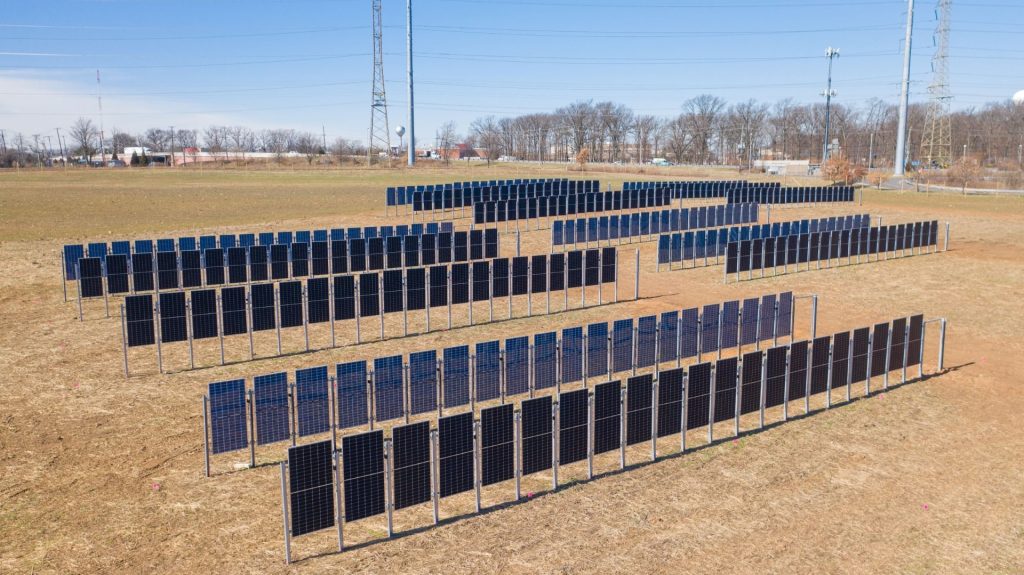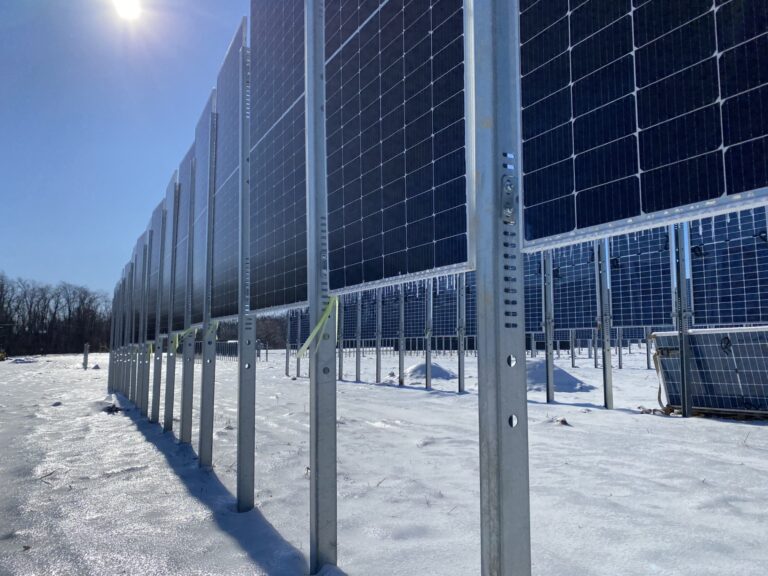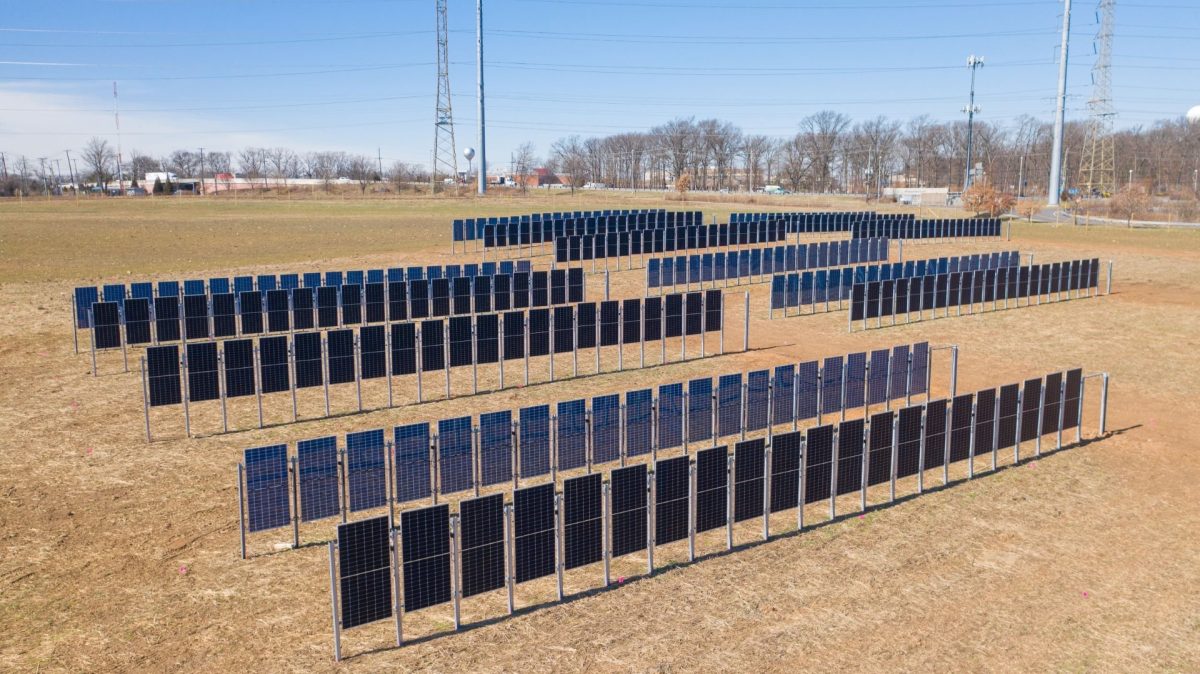
University to test renewable energy system on a working farm with animals and crops
Rutgers University has selected Sunzaun, a vertical solar system for farms developed by solar installer Sunstall Inc., for an agrivoltaics project at its farm on Cook campus.
The farm at Rutgers University–New Brunswick operates as a hybrid of production farm, research facility and teaching operation in support of the Rutgers School of Environmental and Biological Sciences and Rutgers New Jersey Agricultural Experiment Station related activities. The farm, students, faculty and staff care for a variety of animals, including sheep, goats and cattle.
Agrivoltaics refers to the use of land for both agriculture and solar energy generation. Placement of an agrivoltaics system in this environment creates a unique opportunity for researching livestock interaction with solar installations. Results from the project will contribute to the Dual-Use Solar Energy Pilot Program that is administered by the New Jersey Board of Public Utilities (NJBPU).

Sunzaun’s racking system at the Rutgers University Animal Farm on Cook Campus. Photo: AJ Both.
The project was constructed by the New Jersey-based solar energy developer Advanced Solar Products using Sunzaun’s vertical racking system. It is one of the first agrivoltaics systems utilizing vertical racking in the northeastern U.S.
The aim of the project is to investigate the potential benefits of agrivoltaics in a densely populated state with an important agricultural and livestock sector, a large energy demand and limited space to construct renewable energy systems.
The project benefits include:
Innovative Solar Installation: Rutgers selected the Sunzaun vertical solar racking system for its farm facility to minimize obstructions for equipment used to farm the property. The system has a total output capacity of 170 kWDC, and consists of 18 rows of 21 panels each mounted in rows running North to South. This means that peak electricity production occurs during the early morning and late afternoon hours when sunlight is received from the East and the West. Two different row spacings and panel mounting heights were used as part of the experimental design.
State-of-the-Art Solar Modules: Rutgers selected ZnShine 450-watt bifacial solar modules with a bifaciality rating of 70 percent. Panel orientation was varied throughout the system (with primary side facing either east or west), allowing for a determination of the optimum orientation. Power optimizers were installed so that the output of pairs of panels can be tracked, ensuring optimal energy generation and efficiency. These and other bifacial modules are expected be at the forefront of sustainable energy production for all array types.
Integrated Animal Infrastructure: Since the agrivoltaics system will be used for experiments involving forage production and grazing beef cattle, the design included animal shelters (mostly to create a shade area), animal drinking facilities, and a handling chute for safely managing large animals.
Research and Innovation: Researchers will plant a forage crop in April and will start grazing beef cattle in September. The objective is to study the impacts of the agrivoltaics system on forage production and animal grazing, including any behavioral changes the animals may exhibit when grazing among the panels.
Supporting New Jersey’s Dual-Use Solar Energy Pilot Program: This project will support the Dual-Use Solar Energy Pilot Program that is administered by the NJBPU. The program, spanning a minimum of three years, has a goal to explore the feasibility and benefits of agrivoltaics. It is a collaborative effort with the New Jersey Department of Agriculture and the Rutgers Agrivoltaics Program.
Key features of the Sunzaun vertical racking system include its space saving design, which allows energy production in limited spaces, making it an ideal solution for the generation of solar power on agricultural land, in urban environments and in areas with restricted land availability. The vertical orientation of the panels combines a grid-serving production curve, avoiding the midday peak, with other dual-use benefits such as wind protection, suitability for integrating livestock, and providing shade to crops possibly resulting in less water consumption and more optimal growing conditions. With the Animal Farm Agrivoltaics Project, Rutgers is leading the way in sustainable agriculture, renewable energy research, and interdisciplinary collaboration.
About Sunstall:
Sunstall Inc. is a Novato, Calif.-based solar energy company dedicated to providing cutting-edge solar installation services for commercial and utility scale projects. With establishing Sunzaun as the vertical solar system for diverse dual-use applications in the U.S., Sunstall is at the forefront of shaping the future of clean energy. For more information about Sunstall Inc. and its vertical solar system, please visit www.sunzaun.com.
About the Rutgers Agrivoltaics Program:
The Rutgers Agrivoltaics Program (RAP) is a multidisciplinary group of Rutgers faculty and staff committed to designing and conducting the applied agrivoltaics research and outreach necessary for New Jersey farmers to make informed decisions about adopting this technology, as well as its potential role in contributing to the State’s renewable energy goals. RAP is part of the NJ Agricultural Experiment Station and the Rutgers Cooperative Extension Service which provide research, outreach and education resources to residents, communities, and business in New Jersey and beyond. Please visit https://ecocomplex.rutgers.edu/agrivoltaics-research.html for more information.
This article was originally published by the SEBS/NJAES Newsroom.




